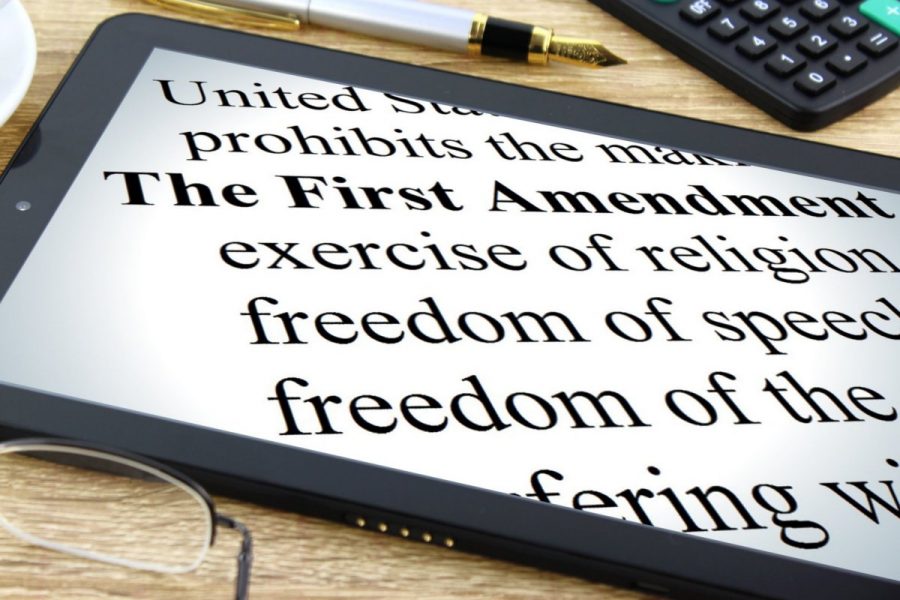Editorial: Students’ first amendment rights under attack
November 1, 2019
In recent months, the expression of political views in school has become an increasing issue. All over the country, American students are voicing their political opinions on a multitude of various platforms: Snapchat, Instagram, Facebook, Twitter, television broadcasts, etc.
Such political expressions may take form as a social media hashtag to bring awareness to a particular issue or vigils commemorating an individual or event that supports a cause. Whatever the form, students have creatively conveyed their beliefs for many years, an example being the 2018 social media movement #Neveragain protesting gun control laws in the United States.
Despite certain student activist movements, many American schools have policies in effect restricting students’ ability to express political beliefs; which raises the question— should students be allowed to express political views in school? Of course they should. Schools should not have the authority to dictate whether or not a student has the right to express political beliefs.
Only two months ago a high school football game was canceled due to school politics. On behalf of Fox News, following the North Carolinian cheerleaders broadcasting a “Trump 2020 Make America Great Again” sign at a North Stanly High football game, the cheerleaders were not only put on probation by the North Carolina High School Athletic Association, but an August 30 football game was canceled as a result of the school interfering threats concerning the safety of their student body.
Fox News said, “’[Stanly County Schools received] additional information that could compromise safety measures our schools have in place for sporting events.’”
According to Jeff James, the County Schools Superintendent, all of the Stanly County Schools have a policy in effect regarding the allowance of displaying political signs. Still, community members criticized the district for violating the cheerleader’s First Amendment rights following their disciplinary action.
Jeremy Onitreb, a supporter of the cheerleader’s right to free speech, said, ““There was no threat…nobody’s coming up there to hurt the kids. It’s not what this was about.”
The North Carolina football game is just one instance in our nation’s history in which student’s First Amendment right has been questioned. Preceding a group of student’s decision to wear black armbands in protest of the Vietnam War, the Des Moines, IA school board passed a preventive ban and requested that the students remove their armbands. High school junior Mary Ellen Tinker, and four others, were then suspended from school, prompting the famous Supreme Court case Tinker vs. Des Moines.
On Feb. 24, 1969, the Supreme Court ruled in favor of students’ rights. The decision occurred with a 7-2 majority that students do not “shed their constitutional rights to freedom of speech or expression at the schoolhouse gate.”
All American public schools must enforce this decision, which prohibits the censorship of student speech so long as it did not inflict interruptions in the classroom.
However, the Tinker vs. Des Moines ruling has not put to rest the ongoing debate whether or not students’ right to free speech is revoked within school.
In regards to the Oshkosh Area School District, the district enforces policies pertaining to student politics.
Policy po5720 outlining student activism guidelines for the district says, “It is the policy of the board of education to encourage students to express opinions and ideas, take stands, and support policies, publicly or privately, orally and in writing.”
The OASD student activism policy clearly justifies the expression of student beliefs in various forms: in conversation, in a presentation, or in writing.
Similarly, policy ag5722 defines the regulations surrounding school-sponsored publications. It says, “Students shall have the right to express their views and attitudes on all issues provided the speech is not: 1) defamatory, libelous, obscene or harmful to juveniles; 2) reasonably likely to cause substantial disruption of or material interference with school activities or the educational process; 3) an infringement upon the privacy or rights of others; 4) a violation of copyright law; 5) a promotion of activities, products or services unlawful (illegal) as the minors as defined by State or Federal law; or 6) otherwise a violation of school policy and/or state or federal law.”
Again, the policy defines that students are allowed to take political stands within the four walls of the school, as well as at additional school directions, without fear of repercussions.
That being said, upon further inspection of policy 5722, published under a different subsection, the district prohibits student expression.
Oshkosh Area School District policy po5722 states, “regardless of their status as non-public or limited-purpose public forums, the board prohibits publications, productions, and advertisements that:
Promote, favor, or oppose any candidate for election or the adoption of any bond issue, proposal, or question submitted at any election.”
The general prohibition not only contradicts what is previously declared as acceptable by policy ag5722, it goes against the court decision following Tinker vs. Des Moines.
While the school allows for staged protests under policy po5720, for example, the gun control protests from 2018 organized by former student Brock Doemel, as a form of student activism, the Oshkosh Area School District no longer allows political beliefs to be published in student publications. This results in censorship of student publications, such as the newspaper, yearbook, or student news broadcasts.
In previous years, lively back-and-forths from opposing electoral opinions flooded the newspaper during elections. These publications never prompted a distraction in the classroom, promoted an illegal activity or infringed on anyone’s rights. So why the sudden change? Where lies the issue with kind-hearted banter? Opposition to different ideas and candidates is a fundamental staple in the United States, and infringing upon students’ rights to do so is a serious form of censorship.
Whether in the form of a sign held up at a football game, a black armband around a student’s arm, or announced in a publication, politics should be allowed in schools. The beauty of America lies within the ability to speak your mind, so why should schools have the right to interrupt this beauty? Across the country, students face ramifications for voicing their opinions. Although our district approved students’ ability to express themselves by means of activism, the continuing censorship of student publications needs to end. Hopefully, someday districts throughout America will allow student politics, but until then, we must fight for the right to voice our opinions. As for us in Oshkosh, this must be done through student activism– so, what will you do about it?


